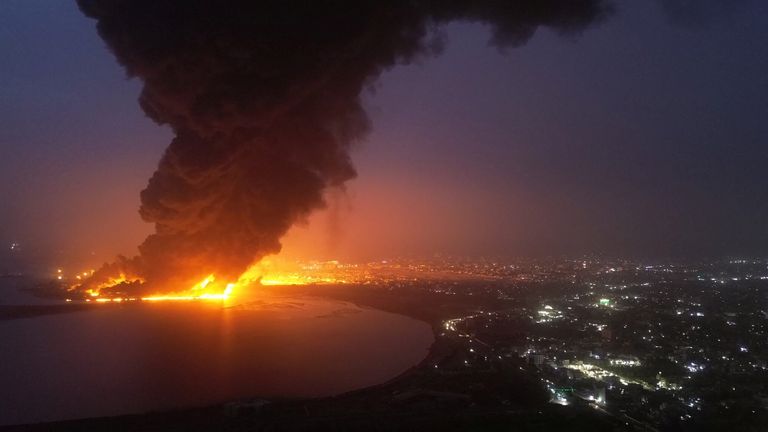Attack on Hudaydah
In a statement on Saturday afternoon, the Israeli army announced that the fighter jets of this regime targeted Yemeni "military targets" in the port of Hudaydah, located on the Red Sea coast in the west of the country, and claimed that this attack was a direct response to the attacks carried out against Israel in recent months. Saudi-run Al-Arabiya news network reported that in the recent attack of the Tel Aviv, at least 40 fuel tanks were destroyed in the Yemeni port. Israeli sources have also mentioned important details about this aggression. Here are some of them:
- 30 warplanes participated in the bombing and the preparation for this mission continued for 36 hours.
- The main target were two main cranes in Hudaydah port, which are key to foreign aid delivery in this port.
- To ensure accurate hitting, special bombs were used.
This attack was conducted a day after the Yemeni army claimed responsibility for a deadly drone attack on Tel Aviv. In the drone attack of the Yemeni army on Tel Aviv, the second largest city of the Israeli regime, at least one person was killed and dozens of others were injured. Yemen announced that it carried out this attack in response to the continued war and crimes of the Israeli regime against Gaza civilians.
Change of game
The Israeli attack showed that for Tel Aviv leaders, the response to Sana'a is of particular importance. Therefore, less than 24 hours after the Yemeni drone attack on Tel Aviv, the Israelis rushed to attack the Yemeni port. On the other hand, the trading of military response between Tel Aviv and Sana'a shows that now the Yemenis have become a direct actor in the war in Palestine. In fact, Yemen is now considered one of the main parties of the war in Gaza, which has entered into a battle with the Israeli invaders in support of the Palestinian people.
Israelis struggle to reverse the air defense failure disgrace
The drone attack launched by Yemen proved the failure of the Israeli air defense systems. So, the attack on Hudaydah appears to be an effort to cover up the failure of the multi-layer Israeli interceptors. In fact, the Israelis have an advanced and multi-layere air defense system, and the penetration of the Yemeni drone showed that Israel's defense is vulnerable against foreign threats. These defense systems include the following items:
- Iron Dome: This system is developed to engage short-range but fast projectiles like rockets and mortars.
- Iron Beam: it is designed to engage missiles and rockets.
- David's Sling: The system is developed to intercept short-range ballistic missiles (SRBM), fighters, drones, and cruise missiles.
Arrow: It is designed to intercept high-altitude and speed ballistic missiles.
Economically checkmating the occupation
The attacks of the Yemeni forces are not only limited to imposing military costs against Israel, but also they have so far been able to impose extensive economic costs on the invaders. Here are some of them:
Bankruptcy of Eilat Port: Golber Gideon, the CEO of Eilat as the southmost port of Israel, has acknowledged the damage to the port and its closure as a result of the Yemeni maritime ban and attacks on Israel over the past 9 months. He said that so far the port has incurred around 50 million shekels ($13.7 million] of damage for disruption of its operations. Disappointed about receiving financial support from Netanyahu's cabinet, Gideon said that they are preparing to lay off half of workers this week. He added that the operation of this port has been stalled for eight months due to resistance forces' attacks and this means that there is no income. Another source reported that in 2023, 149,000 cars were imported to Eilat from the east, but not a single car has entered this port since the beginning of 2024.
Spillover of economic damage to other occupied regions: Some Israeli websites claim that Yemen's Ansarullah Movement is looking for action from some Arab countries in North Africa in the Mediterranean Sea to target Israel. Based on this, now not only Eilat, but also the ports of Haifa and Ashkelon will be exposed to Yemeni attacks, and these threats to the Israeli ports, in practice, means a sea blockade on this regime.
Impasse in alternative corridors: It should be taken into
account that the ground corridor that was launched after the war from
the UAE to Israel to transport Israeli goods from the Persian Gulf to
the Eilat Port to avoid being targeted by Yemenis has failed to provide
an alternative route for maritime shipments coming from Asia. Israeli
officials also claim that the replacement to the Red Sea is the southern
tip of Africa. This means that ships need to sail 2-3 weeks longer to
reach Israel and this will impose higher costs on Tel Aviv in the
future.
/129

